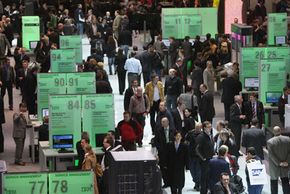Some people might tell you the world is getting smaller, and sometimes it seems that way. This is especially apparent in the things we buy. Many products you can find in the United States, such as clothing and toys, are manufactured overseas in countries like China and India. A lot of the gasoline someone might purchase to fill up a car probably comes from an oil refinery in a faraway country. Food grown on a farm in the Midwest can be shipped to the other side of the world in less than a day.
The ubiquity of the Web has made these networks of trade even quicker to form and more complex. Anyone, no matter his or her interests, can surf the Internet for goods and services and make quick transactions. A student in New York City writing a major thesis on current Japanese animation can get on his laptop, log onto eBay and order foreign DVDs from Japan. Within a matter of weeks, maybe less, a package will show up in his mailbox and he'll be ready to watch and write.
Advertisement
Whenever a transfer like that takes place, information has to be passed from one location to another through the use of computers. For instance, if you want to order a book from Amazon.com, you'll have to provide specific information such as a credit card number and a physical address. Amazon, in turn, will keep that information on file for reference. The term used to describe the production, storing or communication of any kind of data, text, images, codes or any other kind of file is called information technology.
Just like there are laws that regulate the passing of goods between one country and another, there are also laws that cover the transfer of specific trade-related data. How do these laws work? Are they universal, or are they different depending on the country? To learn how information technology works with trade laws, read the next page.
Advertisement




